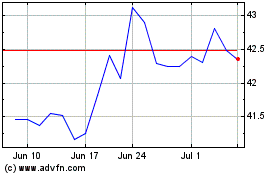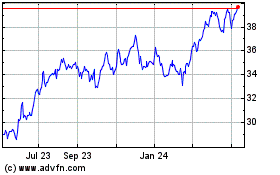Energy Transfer Equity Boss Renounces Hostile Bids
August 11 2016 - 5:51PM
Dow Jones News
By Alison Sider
Veteran pipeline dealmaker Kelcy Warren, chairman of Energy
Transfer Equity, says life is too short for hostile deals.
Mr. Warren told The Wall Street Journal in an exclusive
interview Thursday that was the lesson he took away after months of
wrangling over his plan to buy rival pipeline giant Williams
Cos.
The deal, initially valued at $33 billion, would have created a
100,000-mile network of oil-and-gas pipes, creating one of the
largest systems of fuel-moving arteries around North America. But
its failure doesn't mean Energy Transfer is out of the market.
Mr. Warren still has an acquisitive streak and said deals remain
an important part of the strategy to growing his Dallas-based
energy empire. Energy Transfer is now focused on finding "bolt-on"
deals that complement existing assets, though bigger acquisitions
aren't off the table.
"You know, I wouldn't mind elephant hunting like we did with
Williams. I would actually be very receptive to that," he said.
"But I will never ever do anything again in my career that's
perceived as hostile. I will never do that."
Williams officials wouldn't comment for this article.
Williams rejected Energy Transfer's all-stock offer to buy the
company in June 2015, but Energy Transfer kept pushing the
takeover. Williams's board remained divided over the deal at a
meeting last September; seven directors, including Chief Executive
Alan Armstrong, were opposed to the deal. But the Williams board
eventually approved Energy Transfer's advance in an 8-5 vote.
Only a few months later, Mr. Warren came to see the deal -- and
particularly a $6 billion cash payment his company agreed to give
Williams shareholders -- as a looming disaster that could ripple
throughout his energy-infrastructure juggernaut. Oil prices crashed
after the two companies signed their agreement, freezing pipeline
companies out of capital markets that Energy Transfer needed to tap
to borrow funds to close the deal.
Mr. Warren said Thursday that he tried to renegotiate with
Williams in light of the energy bust but was "stiff-armed" by the
company. Williams has maintained that it fully supported the
merger, but Energy Transfer tried to torpedo the deal.
"When you get into a deal that you do not want to do at some
point because the economics have changed, yet you're obligated
contractually to do it, that's a disruption, a distraction, it's
unhealthy," he said. "That's behind us now."
But Mr. Warren still has work to do convincing investors that
under his leadership Energy Transfer will prosper with stockholders
sharing in the largess, several analysts and investors have
said.
In March, Energy Transfer issued preferred convertible shares to
certain insiders, including Mr. Warren and other company officials,
that effectively insulated them from any future dividend cuts the
company might make. That move upset Williams and its shareholders,
as well as many Energy Transfer investors.
Mr. Warren said the company has no plans to unwind that
transaction, and blamed Williams for not allowing the securities to
be offered to all Energy Transfer investors. He said Energy
Transfer's cash distribution won't be cut, but that the company
would consider offering similar shares to other investors.
The protracted drama hasn't damaged the company's reputation,
Mr. Warren insists.
"I'm not concerned that people will not do business with us
because they think we're not going to deal with them straight up.
Not concerned at all," he said.
Write to Alison Sider at alison.sider@wsj.com
(END) Dow Jones Newswires
August 11, 2016 17:36 ET (21:36 GMT)
Copyright (c) 2016 Dow Jones & Company, Inc.
Williams Companies (NYSE:WMB)
Historical Stock Chart
From Aug 2024 to Sep 2024

Williams Companies (NYSE:WMB)
Historical Stock Chart
From Sep 2023 to Sep 2024
